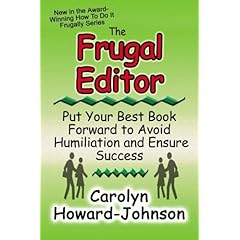As promised, we will announce the winner of “The Frugal Editor” by Carolyn Howard-Johnson this morning! Carolyn, you were so wonderful to take time out of your busy schedule to hang out with us yesterday. Thank you so much for treating the blog readers to a great day!

To do this as fairly as possible, I counted the number of individuals participating (excluding Carolyn and myself ;) ) and put that count (7) into a random number generator found here:
http://illuminations.nctm.org/activitydetail.aspx?id=67
The device drew number 6—which means Laura Hyatt (from the MySpace blog) is the winner! Yay!!! :)
Congrats, Laura! Please send me an email address where you can receive your free copy of “The Frugal Editor” from Carolyn ;) Celebrate with some chocolate!
Okay, on to Writing Wednesday! :)

Self Editing for Fiction Writers by Browne and King is one of my favorite all time how-to books on the craft of writing. Rather than describing what was in the book, I figured we could do a Random Act of Wisdom.
Using Amazon.com’s “search inside” tool, I selected “surprise me” and it opened to Dialogue Mechanics, page 51:
“Perhaps it’s a lack of confidence on the writer’s part, perhaps it’s simple laziness, or perhaps it’s a misguided attempt to break up the monotony of using “said” all the time (more about that in a minute,) but all too many fiction writers tend to pepper their dialogue with –lys.
Which is a good reason to cut virtually every one you write. Ly adverbs almost always catch the author in the act of explaining the dialogue—smuggling emotions into speaker attributions that belong in the dialogue itself. Again, if your dialogue doesn’t need the props, putting the props in will make it seem weak even though it isn’t.
There are a few exceptions to this principle—almost all of the adverbs that actually modify the verb ‘said,” such as “he said softly” or “she said clearly.” After all, you don’t say something grimly in the same sense that you say something softly. The grimness comes across more by what you say and do through word choice, body language, context—than by how you say it. Again there are as many ways to be grim as there are people, and when you write “he said grimly,” what you are rally saying is, “he said this, and he felt pretty grim about it.” You need to show the grimness, to show what your character does that makes him seem grim.”
So let’s give this a whirl. Can you show a sentence of dialogue and a sentence for the tag that conveys a character being grim? I’ll give it a whirl later on today, but I’m truly looking forward to seeing what everyone comes up with.
Some hints to help you:
What challenges do we face in life that makes us grim? The prospect of a very unpleasant event (funerals, death of a loved one) does that for me, but what about a lazy person (work) or a vain person (growing old?)
When we, or our friends and family, or characters exhibit grimness—how does that manifest in body language or physical sensation?
What happens to our voice?
This is how a writer thinks and it’s less analytical than it is observational and empathetic. If you’re having a difficult time conveying grimness, choose another emotion that you would like to explore, but remember: convey it through one sentence of dialogue and one sentence of activity following. (In other words, drop the he/she said part ;))
Hope these hints are inspiring to you and I can’t wait to see what y’all come up with!
Warmly,
Jenny:)




No comments:
Post a Comment